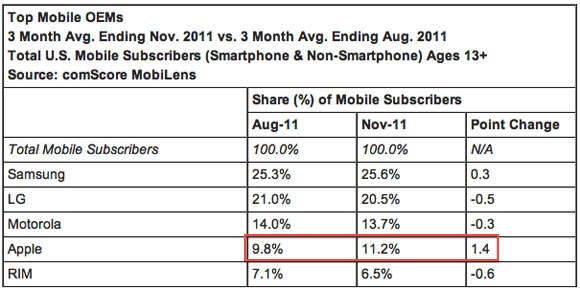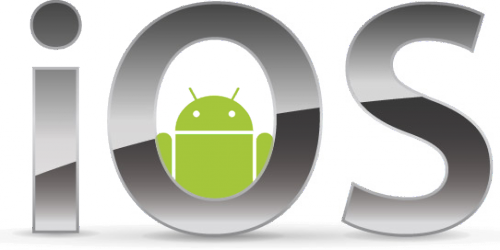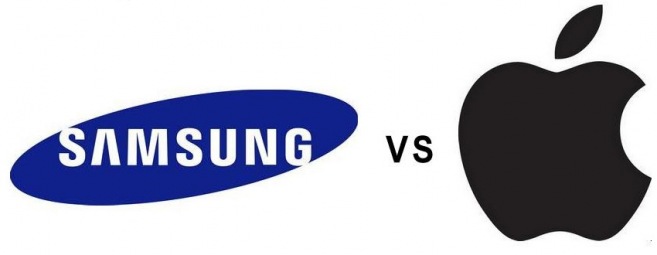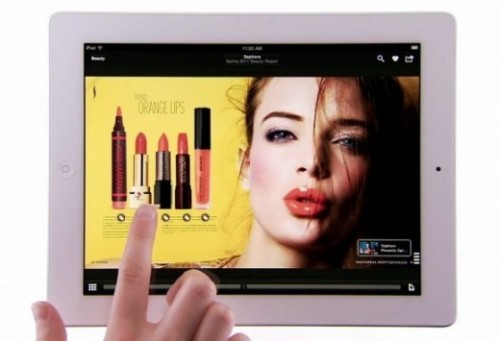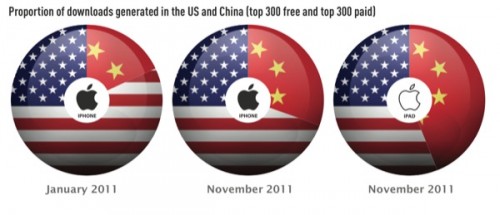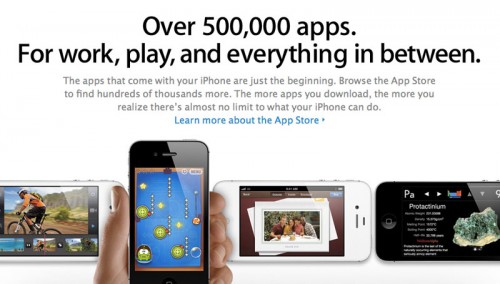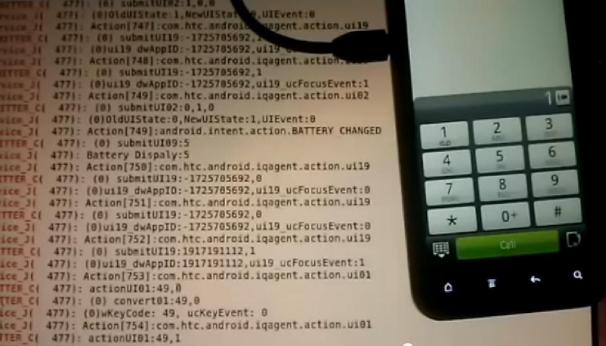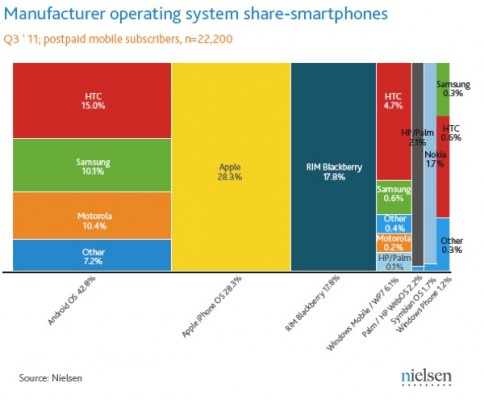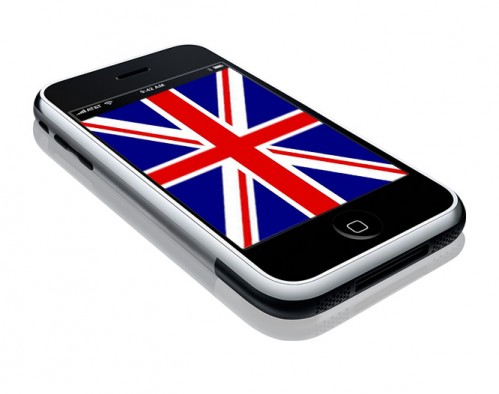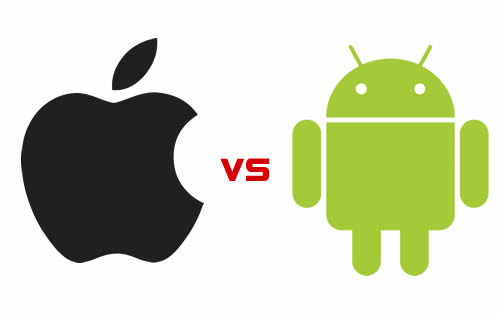News tagged ‘Droid’
Apple's iOS finishes 2011 with 52% share of mobile Web browsing
The latest figures from Net Applications show that Apple closed out 2011 with a commanding 52.1 percent share of mobile devices tracked browsing the Web. In second place was Java ME with 21.3 percent, while Google's Android came in third with just 16.2 percent.
Apple's share slid from 54 percent in November of 2011, and is down from its high of 61.5 percent in October. But it's also up from the 46.6 percent share iOS was tracked at in February of 2011. Coming in fourth in the data was Nokia's Symbian platform, with 5.8 percent, while Research in Motion's BlackBerry holds 3.5 percent. Interestingly, while sales of new BlackBerry devices have been weak, December of 2011 proved to be the best month of the year for RIM.
If dividing Apple’s devices shares in mobile web-browsing, the iPhone took 25.2 percent and leads all mobile devices. The iPad, though, was the second most popular device, with a 24.5 percent representation.
In the PC market Apple’s Macs platform finished with 6.4 percent in December of 2011 comparing with the 92.2 percent share Microsoft held with Windows. Windows XP, despite being 10 years old, is still leading the market with 46.5 percent. Windows 7 is in second with 37 percent, while Windows Vista holds 8.44 percent. As for Apple's Mac OS X, Mac OS X 10.6 Snow Leopard platform remains its most popular at 3 percent, Mac OS X 10.7 Lion, released in July, closed out 2011 with a 2 percent share in December.
Android and Apple Eat Into RIM and Microsoft Smartphone Marketshare
Market research company comScore their latest estimates of market shares taken by the main players on the mobile market. Apple’s share continues to slowly move upward with 11.2 percent of all U.S. Mobile Subscribers.
Apple could collect $10 for every Android device sold
Kevin Rivette, managing partner at intellectual property firm 3LP Advisors LLC, said in an interview with Bloomberg that if Apple were to abandon its lawsuits against Android smartphone manufacturers and instead negotiate licensing fees for its patented technology, Apple could collect $10 for each Android device sold. But as far as we know Apple is not interested in licensing Apple's patented technology to Android manufacturers. Steve Jobs called the Android products as the “stolen” ones and wanted “to go thermonuclear war” against Android.
"A scorched-earth strategy is bad news because it doesn't optimize the value of their patents -- because people will get around them," Rivette told Bloomberg.
"It's like a dam. Using their patents to keep rivals out is like putting rocks in a stream. The stream is going to find a way around. Wouldn't it be better to direct where the water goes?"
Such approach makes mobile devices manufacturers to modify their infringing products and work around Apple's intellectual property. For example, earlier this month, the U.S. International Trade Commission found that HTC was in violation of an Apple patent related to "Data Detectors," but only a day later HTC said it was testing new devices that work around Apple's patent.
Apple’s Ongoing Patent Battle May Pose Risks For Its Shareholders
According to , Apple’s ongoing patent war with the manufacturers of Android-based devices has mixed results. Bloomberg wrote that Apple could cut its losses and earn 10$ per Android-based device sold if the company would reach settlements with its competitors.
iOS, Android activations surge 353% on record setting Christmas Day
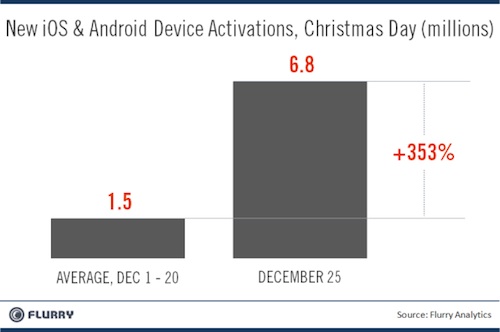
In the first 20 days of December, mobile device activations tracked by analytics firm Flurry were around 1.5 million each day. As for December 25, it indicated that devices running Apple's iOS and Google's Android platforms saw a huge spike in activations, growing 353 percent from average totals earlier in December. The previous record tracked by Flurry belongs to Christmas Day in 2010. On December 25, 2010 the users activated 2.8 million devices.
Flurry's statistics come from the company's analytics software, which is found in more than 140,000 applications. Peter Farago, vice president of marketing with Flurry, claimed that his company's statistics detect "roughly" 100 percent of new iOS and Android devices activated each day. Application downloads on both iOS and Android also grew by 125 percent on Christmas Day, reaching 242 million. For the first 20 days of December, downloads averaged 108 million.
Flurry expects that by the end of the year 2011 Apple's App Store will exceed 10 billion application downloads. Moreover, iOS applications rake in 300 percent more revenue than their Android counterparts. During Apple’s last quarterly earnings conference call Apple has not revealed daily iOS activations in over a year, but announced that more than 250 million iOS devices had been sold during the quarter.
iOS dominates mobile shopping with 92% of market
A study by retail analysis firm RichRelevance released on Friday notes that Apple's iOS dominated mobile online shopping in 2011, holding just over 92 percent of the market, reports Market Watch. iOS users spend 19 percent more than those using Google's platform on mobile purchases.
The study has analyzed 3.4 billion shopping sessions between April and December 2011. The iOS devices share in mobile sales grew from 88 percent in April to over 92 percent in December. This proves that Apple's iOS growth continues to lead the market in many ways including online browsing.
“The numbers across our retailing partners sites demonstrate just how powerful the iOS platform is enabling mobile web shopping and, while still below 5 percent in total conversion, mobile traffic’s doubling in eight months is a trend we only see accelerating,” said Rich Relevance CEO David Selinger.
Dominant U.S. App Store may be surpassed by China in 2012
According to a new study released by market research firm Distimo, despite the proliferation of handsets running Google's Android OS, which now accounts for 53 percent of the mobile smartphone market, Apple's U.S. App Store remains the top marketplace for mobile downloads. But Chinese App Store sales continue to grow and may even bypass Apple's U.S. App Store numbers in 2012.
Over the course of 2011, Apple's iPhone app sales saw a steady decline month-to month, though Distimo blames the lull on the later than usual release of the iPhone 4S. The lowest point of the year occurred in September when anticipation for the 4S was highest, and was followed by a spike upon the handset's debut. Peak revenue for the U.S. App Store came a little over a month after the newest version of Apple's smartphone was released. The same "anticipation effect" was seen in app sales for the iPad, as downloads declined in January and February only to pick up steam after the iPad 2 was released in March.
China now demonstrates a strong increase in downloads through 2011 and may surpass the U.S. App Store in 2012.
RIM now worth less than Apple's App Store alone
Research in Motion is struggling now for its share of the mobile market. But the price of its stocks is getting lower and lower, so the company is worth less than the estimated value of just Apple's App Store. An analysis from Trefis' Brian S. Hall notes that at a price of $13.44, RIMM stock finished last week at a total value of just $7.04 billion, less than the $7.08 billion that Apple's App Store is estimated to be worth. As for the whole Apple company, AAPL stock has a market cap of $354 billion, or more than 50 times greater than RIMM.
"The App Store is probably worth more than BlackBerry," Hall wrote. "All of BlackBerry. Just the App Store. Nothing else. Not the iPhone or iPod. Not Mac. Just the App Store."
App Store is now one of the key components of Apple’s success. Just a year of Apple's iTunes Store and App Store’s operation costs Apple $1.3 billion, but last year only developers received $2.5 billion in payments in the App Store. According to a last week report, iOS applications bring in 300 percent more revenue than their Android counterparts.
RIM's stock has been showing decline in the price since the company announced last week that BlackBerry shipments reduced year over year while the company managed to ship just 150,000 PlayBook tablets last quarter. Moreover the company delayed the release of its next-generation smartphone operating system, BlackBerry 10, until the second half of 2012.
Cloud Gaming Company OnLive Releases Its App For Tablets And Mobile Platforms
The pioneer of cloud gaming has the release of its playable app for tablets and mobile devices. Now top-tier, console-class games that was previously limited only to computers and consoles are available for playing through the free on more than half a million mobile devices over mobile networks and Wi-Fi in the UK and US.
Apple Admits to Court that Samsung Will Draw More Customers from Android than iOS
Early today, we have reported that the U.S. judge declined to issue a preliminary injunction barring Samsung from selling several of its Galaxy smartphone and tablet devices in the United States. We have also mentioned the court order that had been redacted and which revealed that Apple had licensed one specific iOS interface patent to both Nokia and IBM. Now Reuters reports how this court order came to light.
In her 65-page ruling denying Apple's request for a preliminary injunction against Samsung, Koh attempted to redact nearly two dozen sentences or short fragments. But because of a formatting characteristic in the prior electronic version, the redacted material can be viewed by copying text from the PDF and pasting it into another document.
In the court order Koh cites as part of her rationale Apple's admission that Samsung is more likely to take market share from other Android manufacturers than it is from Apple.
Developer revealed codenames for all iOS versions
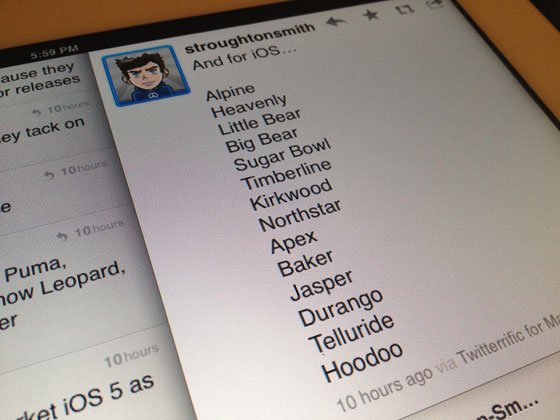
There are many official codenames for operation systems. For example, Mac OS 10.7 is Lion, Android 4.0 is Ice Cream Sandwich. But we have never heard of iOS codenames. TiPB reports that developer Steve Troughton-Smith has revealed what Apple's codenames are for each iOS version. Here they are:
- 1.0: Alpine (1.0.0 – 1.0.2: Heavenly)
- 1.1: Little Bear (1.1.1: Snowbird, 1.1.2: Oktoberfest)
- 2.0: Big Bear
- 2.1: Sugarbowl
- 2.2: Timberline
- 3.0: Kirkwood
- 3.1: Northstar
- 3.2: Wildcat (iPad only)
- 4.0: Apex
- 4.1: Baker
- 4.2: Jasper (4.2.5 – 4.2.10: Phoenix)
- 4.3: Durango
- 5.0: Telluride
- 5.1: Hoodoo
Logging Software From Carrier IQ Is Found On Many Mobile Phones
During the last several days, there have been many reports on the findings of revealing that logging software is present on many BlackBerry, Nokia and Android phones. The software called "IQRD" was developed by the company Carrier IQ. The summarized the showing the scope of logging.
Apple still No. 1 manufacturer in growing US smartphone market
According to findings released on Tuesday by Nielsen, Apple remained the largest smartphone manufacture in the Unites States in the third quarter. While smartphones sales continue to grow in the U.S., accounting for 56 percent of all cellphone sales in the prior quarter, Apple’s market share has reached 30%. Apple's third quarter performance was followed by HTC with a 20.3% share.
As for mobile platforms, Android and iOS dominate with a 71.1% share, holding 42.8% and 28.3% respectively. About a half of all mobile users in the United States owns a smartphone. During the prior quarter 56% of all handsets purchases were smartphones. The third place still belongs to RIM's BlackBerry platform with 17.8% that was followed by Microsoft's Windows Mobile platform, HP's Palm/webOS, Symbian and the fledgling Windows Phone.
App downloads in the third quarter saw that Google and Apple have the largest share. 83% of all downloads were made through Android and iOS devices. But Google has recently expressed dissatisfaction by the situation with app downloads, and hinted at upcoming changes that would bring its online store more in line with Apple's.
Pent-up demand helps iPhone take top spot in UK market with 43% share
According to research firm Kantar Worldpanel ComTech, demand for Apple’s iPhone 4S helped the company to push it market share in the UK to nearly 43% in October. Apple's U.K. market share increased 2.8 percent to 27.8 percent year-to-year and it is the first time since late 2010 when Apple’s sales beat Android-based handset sales in the region.
"Apple took a whopping 42.8 percent share of all smartphone sales, giving it a significant lead over Android - a feat many thought was impossible," said Dominic Sunnebo, global consumer insight director at the firm.
About 75 percent of British customers who purchased an iPhone 4S in October already own a previous version of the device, with 14 percent upgrading from last year's iPhone 4. Sunnebo claims that the main driver for the sales of the iPhone 4S in the U.K. was the existing iPhone users. The second driver is rather long period between the launches of the iPhone 4 and 4S.
84% Of iPhone Users Plan To Stay Loyal To iOS
Last week Gartner reported that Android doubled its market share year-over-year, while Apple experienced a decline at 15%, compared to the previous quarter. Despite that fact, a from research company GfK () states that iPhone users are more likely to show loyalty to iOS by buying another iPhone when upgrading their smartphone.

 Leave a comment
Leave a comment